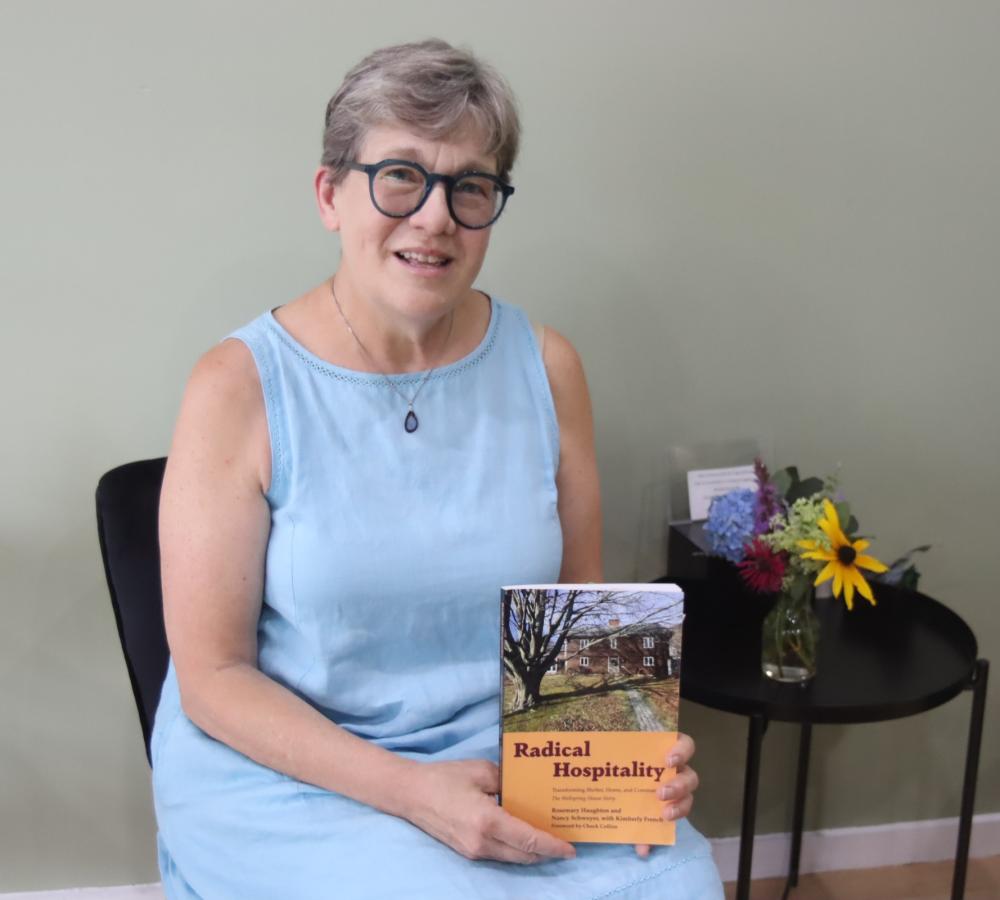Two women, 500 families: Local author pens story on womens home with 'radical' vision
MIDDLEBORO — Once upon a time, two women left their jobs, their careers and the world they knew. Together they bought a home and opened it up to homeless women and their children.
In the 1980s, when the federal spending cuts and soaring housing costs put millions out on the streets, Rosemary Haughton and Nancy Schwoyer, along with several other church friends, co-founded “Wellspring House” in Gloucester, Massachusetts.
Wellspring House developed into a nonprofit that provided shelter, affordable housing, educational opportunities, free food and childcare assistance to women in need. Since it opened, Wellspring House has helped 500 families get back on their feet.
Middleboro author and Chair of the Community Preservation Committee Kimberly French tells Haughton’s and Schwoyer’s story in the book ‘Radical Hospitality,’ which was published in early June.
Nemasket Week reporter Anna Milton sat down with French to discuss her work and what she gained from it.
Question: As Chair of the Community Preservation Chair in Middleboro, you seek funding for affordable housing projects. How has co-authoring this book informed your work in that role?
Answer: The research I did for this book showed me how difficult it is to create affordable housing and how difficult it is to qualify for it. Your income has to be in this certain range and the housing you’re applying for has to have a certain price tag. One of the things I learned about working on this book is that to create affordable housing, you have to think outside the system. That’s what these women did.
Q: Wellspring House becomes so much more than just a shelter. It truly becomes a home for people, where residents and staff come together to celebrate, eat and support each other. How do you think Wellspring House could be a model for what new affordable housing could look like?
A: I think one of the key things they did was create this interdependent community, where people in the same circumstances got to know each other. They called it ‘mutuality’, which has to do with the understanding that all of us are sometimes the teachers, sometimes the learners. We all are sometimes in need of things. I think Wellspring House showed that having that basic understanding and idea of an interdependent community is a much stronger basis for helping people lift themselves out of poverty.
Q: Do you think something similar to Wellspring House could exist in Middleboro?
A: I think it could exist anywhere. But you can’t discount the amount of passion and commitment and hours and patience that the founders put into this. It’s not something that could be created by a government or an institution. It’s really a path. It has to come from a passion within somebody who just wants this so badly, they’ll do anything to make it happen.
Q: The title ‘Radical Hospitality’ comes from the fact that Haughton and Schwoyer would realize in retrospect that Wellspring House took hospitality to another level. In the book they admit that opening up a home to strangers with different backgrounds and ideas can be risky. What would you say to people who are concerned about the safety risks that come with opening a community’s doors to people who are vulnerable?
A: I guess it comes down to asking ourselves: What do we want? Do we want to build this little wall of money and protection around ourselves or do we want to live in a community? There’s always a risk living in a community.
Haughton and Schwoyer didn’t take people in with addictions and very rarely took in men, so they did things to protect themselves. I think you have to deal with those things as they come up. You have to have a certain amount of faith that people want the same things: what’s best for their family, a community, education for their children, a good job.
Q: Would you say there are examples of ‘radical hospitality’ in Middleboro?
A: That’s a good question. My friend and colleague Bill Howe stepped up to provide clothing and other basics to the migrants who were lodged here. I feel like that’s an example of radical hospitality. The Sacred Heart Food Pantry is a pretty good example of radical hospitality. I’m sure there are a lot of others I can’t think of at the moment.
Bill Howe is a member of the Social Justice team at the First Unitarian Universalist Society in Middleboro.
Q: How would you go about creating more affordable housing in Middleboro?
A: There are two ideas that really intrigue me, but I don’t know if they’re possible. One is the idea of establishing a land trust, which is created when a community organization buys land and permanently holds it in a trust for affordable housing and other community needs. People can buy the housing, but the land stays in the trust.
That way, people can’t make a killing if they decide to sell the house. I’m also crazy about the idea of tiny homes, and creating cluster tiny housing, for veterans or other populations. I know that would require going through hurdles like zoning changes, but I would love to see that here.
Q: The book talks about the philosophy that housing should be a right. What would that mean in terms of government policy?
A: A right to housing doesn’t mean you give everybody a free house by any means. It means you put in place policies that support non-profit or cooperative housing initiatives or land trusts, to help people stay in their homes. You enact policies that put limitations on public property developers and regulate the market to prevent evictions.
Q: Could land trusts be something we see in Middleboro’s future?
A: I haven’t looked into it. I know there are tremendous hurdles. I really don’t know the answer.
Following the interview, French spoke with Chuck Collins, who worked for the Institute of Community Economics and helped Wellspring House founders create a land trust. Collins said creating land trusts is an option for communities like Middleborough. It's something a nonprofit housing organization could set up.
Q: What do you admire most about Haughton and Schwoyer?
A: So many things. Passion. Confidence. Their vision. Their hard work.
Haughton and Schwoyer continued to live in Wellspring House after retiring from the organization. But in 2018, they found themselves facing the same situation as the women they helped: after a change in Wellspring House leadership, they were evicted. Wellspring House is still in operation but follows more of a traditional non-profit business model, French said. The home is no longer open to homeless families.
The book launch for ‘Radical Hospitality’ was held on June 9, 2024. Haughton, who’s health had been declining over the last two years, passed on May 9 — but not before she was able to hold a copy of the paperback containing her life’s work, according to French. Nancy Schwoyer lives in Yorkshire, England, where the couple moved a few years ago to be near family.













